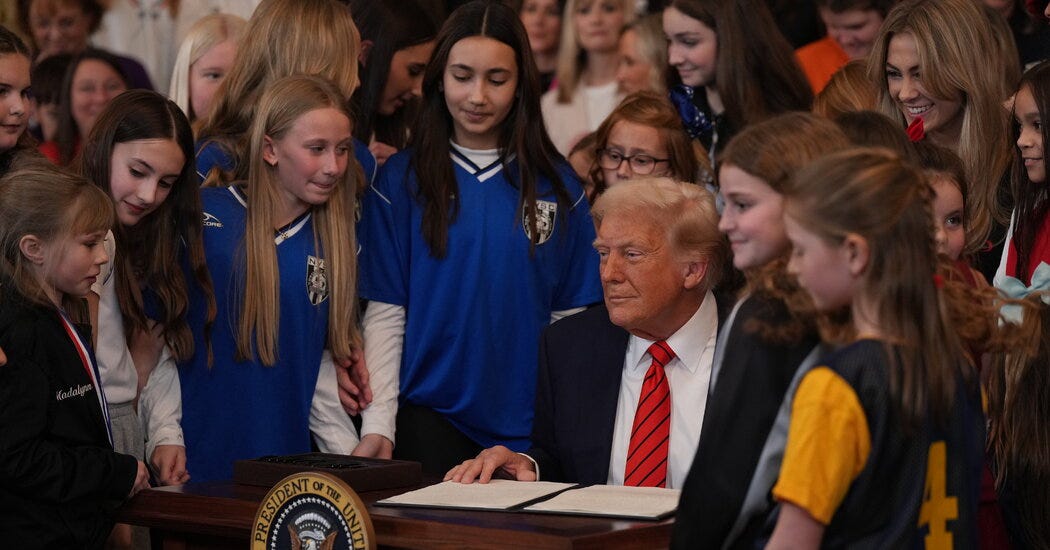Retrospective: Trump's Executive Order on Males in Women's Sports
On not joining a cause you agree with
On Wednesday, ESPN announced Trump’s Executive Order banning biological males in women’s sports. The way the WWL phrased it led to some mockery from conservatives and others who’ve supported guardrails that keep women’s sports female:
President Donald Trump will sign an executive order Wednesday designed to prevent people who were biologically assigned male at birth from participating in women's or girls' sporting events.
I get it, but there’s also an element of “take yes for an answer.” The article itself was fairly dry and by the book. Whereas ESPN had previously been quite biased towards Team Social Justice on this issue, they’ve moderated with the times, announcement tweet not withstanding. It’s a new era on this particular topic. From the ESPN article:
The order offers some clarity. For example, it authorizes the Education Department to penalize schools that allow transgender athletes to compete, citing noncompliance with Title IX, which prohibits sexual discrimination in schools. Any school found in violation could potentially be ineligible for federal funding.
A day later, the NCAA fell in line with Trump’s EO.
In Trump’s first term, he was less able to marshal concurrence from large institutions. Back then, it felt like, while Trump was technically “in power,” he wasn’t actually in power. First Term Donald was quite unfocused, lacked bureaucratic allies, and so many of the nation’s power centers did as they pleased in defiance.
It’s different now, mostly because Trump’s opponents have lost ground with the public, due in part to matters like this. Now he gets to make a popular law, stage a wholesome photo op and have JK Rowling tweet out:
Congratulations to every single person on the left who’s been campaigning to destroy women’s and girls’ rights. Without you, there’d be no images like this.
Ultimately what will likely be lost to history is just how precarious it was to take this now 79 percent (!) position. Indeed, how many mainstream sports writers took it? How many are even taking it now? There remains lingering professional stigma in aligning yourself with damn near everybody.
I took the majoritarian position, back in the early days of this website. I, sounding at times like a broken record, would describe the “women’s sports should be for females” issue as a “supposedly contrarian position endorsed by 70 percent of Americans” (I didn’t want to get derailed by citing the actual meme-worthy 69 percent number). The broader public has since moved even more towards the supposedly “right wing” stance here. As I cited, the New York Times polling has this perspective grazing 80 percent.
Obviously majoritarian endorsement doesn’t make a position “good” or “moral,” but there was just something off to me about how the overwhelmingly mainstream view was treated as freakish by supposedly mainstream sports media. We couldn’t talk about this? We couldn’t discuss the totally reasonable objections large swaths of the population might have to allowing biological males into women’s sports at all levels? You’d bring it up and the conventional dismissal from my peers was that this was giving in to a scare tactic because the topic involved so few athletes. Setting aside how male trans swimmer Lia Thomas was setting swimming records, that argument never made sense to me. If the topic didn’t matter, then why was it worth Dems digging in and potentially losing a general election over? If it’s just a fringe distraction, then why can’t the influential people bend the knee to public sentiment?
If it sounds like I’m taking a victory lap, then I should correct the record. I was not involved in the counter activist push that turned the tide on this. Indeed, Jennifer Sey, Founder and CEO of XX-XY Athletics, reached out multiple times to appear on my podcast, and I did not accept.
Why did I not? I’m still puzzling over it. As stated, I agreed with Sey on this specific subject, but I’m also generally uncomfortable with formally joining activists. Let’s get into why that was and also revisit what a massive preference cascade this theoretically niche matter represented.


